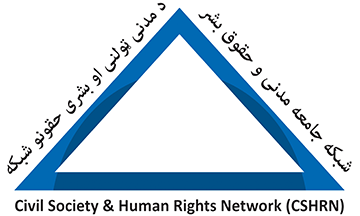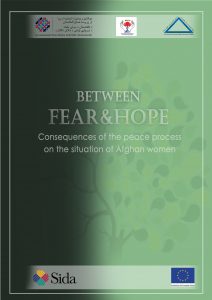
Civil Society and Human Rights Network(CSHRN)
Women and Peace Between Hope and Fear

Abstract
 The intra-Afghan peace talks have caught Afghan marginalized communities, especially women between hopes and fears. After almost two decades of armed conflict, the peace talks between the Afghan government and the Taliban, initiated in early September in Doha, have seen convoluted twists and turns that created public distrust over the Taliban’s true will as the group has incessantly stressed on the continuation of violence. The main purpose of the talks is to end several decades of violence and reach a political settlement through a win-win peace accord. However, many women activists across various walks of life in Afghanistan are now worried about the possible implications of what they call a “bad deal” between the two parties in which their rights and hard-won gains of recent years might be compromised with the Taliban. The unpleasant memories Afghan women hold from their living conditions under the Taliban regime in the 1990s and severe losses inflicted upon them afterward have brought them together to jointly speak up for the preservation of their achievements, and meaningful participation in different spectrums.
To that end, women activists and those at the grass-root level alike urge the government and the Afghan negotiating team to mainstream gender perspectives at the heart of the peace agenda. In addition, they call on their strong, meaningful representation at all levels of peace talks with the Taliban, which will ensure the inclusivity of the process. The more inclusive the peace process, the more durable it will be. Women’s under-representation will not only delegitimize the outcome of any potential peace agreement but would also perpetuate violence for the next several years to come.
The intra-Afghan peace talks have caught Afghan marginalized communities, especially women between hopes and fears. After almost two decades of armed conflict, the peace talks between the Afghan government and the Taliban, initiated in early September in Doha, have seen convoluted twists and turns that created public distrust over the Taliban’s true will as the group has incessantly stressed on the continuation of violence. The main purpose of the talks is to end several decades of violence and reach a political settlement through a win-win peace accord. However, many women activists across various walks of life in Afghanistan are now worried about the possible implications of what they call a “bad deal” between the two parties in which their rights and hard-won gains of recent years might be compromised with the Taliban. The unpleasant memories Afghan women hold from their living conditions under the Taliban regime in the 1990s and severe losses inflicted upon them afterward have brought them together to jointly speak up for the preservation of their achievements, and meaningful participation in different spectrums.
To that end, women activists and those at the grass-root level alike urge the government and the Afghan negotiating team to mainstream gender perspectives at the heart of the peace agenda. In addition, they call on their strong, meaningful representation at all levels of peace talks with the Taliban, which will ensure the inclusivity of the process. The more inclusive the peace process, the more durable it will be. Women’s under-representation will not only delegitimize the outcome of any potential peace agreement but would also perpetuate violence for the next several years to come.